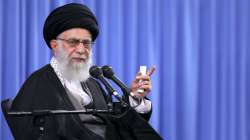Delhi riots: Iran’s Supreme leader's remarks may affect India’s Shia Muslims, affect ties, warn experts
“Iran should refrain from making such hostile statements against India. The Supreme Leader must realise that such threats against India could possibly serve towards marginalising India’s Shia Muslims from the mainstream."

Iran Supreme Leader Ayatollah Ali Khameini’s scathing criticism of India on Friday could have repercussions for India’s Shia community, besides having implications on the bilateral ties, experts have warned.
“Iran should refrain from making such hostile statements against India. The Supreme Leader must realise that such threats against India could possibly serve towards marginalising India’s Shia Muslims from the mainstream,” said defence expert Qamar Agha.
US-based think tank Pew Research Survey has estimated that Shia Muslims constitute 15 to 20 per cent of India’s overall Muslim population. India, which has between three to four crore Shia Muslims, has the second-largest Shia population in the world outside Iran.
In a stern warning to New Delhi, Khameini warned India of "isolation from the world of Islam" if it failed to stop the "massacre of Muslims.
Khameini’s remarks came through a tweet on Friday, in which he also called upon New Delhi to “confront extremist Hindus.” The remarks were apparently made in the context of last week’s sectarian clashes in the National Capital, which left at least 53 persons dead and thousands more displaced.
“Despite sanctions by the US on Iran, we have continued to maintain a balance in our ties with respect to Tehran. They must appreciate the fact that India has remained a steadfast ally of Iran despite pressure from the US,” reckoned Agha.
The veteran defence expert further pointed towards Iran’s own repressive policies, highlighting that dozens had been left dead in a security crackdown by Tehran in the wake of countrywide protests over the increase in fuel prices in November last year.
Human rights group Amnesty International has alleged that at least 304 people were killed by Iran’s security forces in the crackdown, widely condemned on the global stage.
“Even the Shias in Iraq are up in arms against Tehran,” Agha added, pointing out that Iran wanted to project itself as a “leader of the Islamic world.”
Agha, however, conceded the strategic importance of Iran to India, noting that it served as “India’s gateway to Central Asia” and an important energy supplier to New Delhi.
“But they should desist from such behaviour,” he added.
Former foreign secretary Kanwal Sibal was equally critical of Iran’s Supreme Leader remarks, saying that they were “uncalled for.”
“Such remarks from their top leadership will only affect our bilateral ties over short to medium term. India might think twice before backing Iran on the international platform next time around if any situation comes up,” said Sibal.
Not only Khameini, but even Iran’s foreign minister Javad Zarif had hit out at New Delhi earlier this week over the violence in Delhi’s north-east district last week.
Zarif’s statement had invited sharp criticism from the Ministry of External Affairs (MEA), which summoned Iran’s envoy to India Dr Ali Chegini to register a strong protest on India’s behalf.
“It was conveyed that his selective and tendentious characterisation of recent events in Delhi are not acceptable. We do not expect such comments from a country like Iran," MEA’s outgoing spokesperson Raveesh Kumar said in a statement on March 3.
As of Friday, Delhi Police registered at least 683 cases in connection with last week’s sectarian riots. The Capital’s police force said that it had detained or arrested 1,983 people for allegedly being involved in violence.
Also read: India setting-up Coronavirus test lab in Iran before bringing back citizens